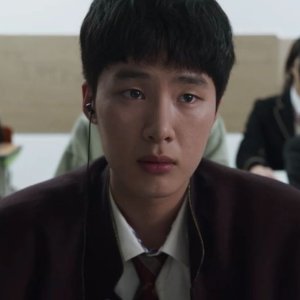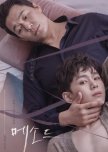
An Unraveling of Identity and Obsession on Stage and Off
What drew me into Method wasn’t the promise of a romantic slow burn. It was the casting. The film centers around Yongwoo, a member of a popular boy group, and Jaeha, a seasoned stage veteran with decades of gravitas under his belt. It’s a curious pairing at first glance. Youth and idol fame clashing with age and theatrical prestige. That tension alone was reason enough to watch. What I didn’t expect was to be pulled into a psychological drama that defies genre expectations and left me questioning where the character ended and the performance began.One of the most immediate things that sets Method apart is its chemistry. It didn’t feel rushed, superficial, or shoehorned in for fanservice. It crafts an almost unsettling tension. Every glance, every line read in rehearsal feels loaded. At times tender, at others unnerving. The chemistry between Yongwoo and Jaeha is electric, but not in a romanticized way. It’s raw, uncomfortable, and, most crucially, earned.
The dynamic between the two characters is built on an intentional imbalance. Jaeha doesn’t take Yongwoo seriously.. and why should he? Yongwoo enters the world of theater as a detached idol with no passion for the play they're rehearsing. Jaeha is a man who has bled for his craft, and he sees Yongwoo as little more than a shallow pretty face. That perception begins to shift as Yongwoo becomes entranced. Not just by Jaeha as a person, but by Jaeha’s unwavering devotion to acting. The first screenplay read-through scene is burned into my memory.
It’s reductive to call Method just a BL. If anything, it weaponizes the genre’s conventions to lure viewers in, only to dismantle them scene by scene. This isn’t a love story. It’s a tragic character study about obsession, artistic dissolution, and the dangers of identity blurring between role and reality.
Jaeha doesn’t fall in love, he falls into his character. Walter consumes him. He withers under the weight of his own method acting, and in doing so, drags Yongwoo down with him. But Yongwoo’s downfall is more chaotic. He doesn’t become someone else; he loses himself in Jaeha. His affection metastasizes into fixation. It culminates in a harrowing moment where he breaks into Jaeha’s home and stands silently over him and his wife as they sleep. There's no romantic justification, no tragic poetry.. just a haunting display of emotional possession.
There’s no love here, only consumption. The kind that gnaws away at your sense of self until all that’s left is the performance.
What makes Method remarkable is its refusal to play to expectations. It’s not romantic, but it is intimate. It’s not erotic, but it simmers with tension. And above all, it’s an exploration of what happens when the line between who we are and who we pretend to be collapses entirely.
Was this review helpful to you?
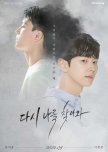
A Twist in Time That Misses the Mark — A Disappointing Drama with Wasted Potential.
I stepped into this time-slip drama with tempered expectations.. and walked away feeling vindicated for not hoping for more.Let’s get one thing straight: this series isn’t a complete disaster. It’s not the kind of show that leaves you angry for wasting your time, but more the kind that earns a slow blink and a shrug.
“That was it?” sums it up well. There’s a shell of a great idea buried somewhere beneath the half-baked character arcs and incoherent narrative threads, but it’s a shell that never quite gets cracked open.
Moon Ji-yong’s performance is one of the few commendable aspects of the series. He clearly put effort into his portrayal, delivering emotion with conviction, especially during some of the more tender or desperate moments. Unfortunately, his character is written with the complexity of a soap bubble. His portrayal can only do so much when the script hands him so little.
The central conceit had serious promise: Shin Jaewoo travels back to 2007 to prevent the murder of Kang Jihoon, a tragedy rooted in Jihoon’s brave attempt to save 10-year-old Jaewoo from being kidnapped. As the narrative unfolds, the two form a romantic connection.. a storyline that could have been emotionally resonant, had the show earned that emotional payoff.
Instead, what we get is a rushed, underdeveloped mess. The story races through critical turning points without giving them space to breathe. The emotional beats feel unearned, largely because the writing doesn’t allow the characters to make believable or even remotely logical choices. Every decision made by the leads feels driven not by character motivation, but by a writer’s need to keep the plot limping forward.
Frankly, the logic of time travel isn’t even the issue here. Time travel is hard to get right, sure, but many successful dramas (“Signal”, “Someday or One Day”) have navigated its paradoxes with elegance. This show doesn’t even try. The problem isn’t temporal mechanics; it’s narrative laziness.
No one in this series acts in a way that makes emotional or logical sense. The motivations are paper-thin, and some actions are so absurd they border on parody. As a result, it’s nearly impossible to care about the characters’ fates. When the ending arrives, it carries little to no emotional weight. We’re told to care, but we’re never shown why we should.
Jaewoo’s and Jihoon’s romantic relationship could have been its emotional core, but it barely registers. There’s no spark, no real tension, no compelling buildup. It’s a romance that feels less like a development and more like a bullet point on a planning board.
Oddly enough, the only parts that do work are the lighthearted interludes. Hyungjin’s supporting role injects the kind of levity the show desperately needs more of. His few comedic moments, particularly a short scene where Jihoon carries Jaewoo back to the dorm, are the only times the series feels alive. But even that glimmer of charm is fleeting.
Had the creators leaned into a more slice-of-life, romantic-comedy angle, embracing the fluff, the absurdity, and the sweetness, it might’ve carved out a memorable identity. Instead, it feels like they dumped a bunch of disparate story elements into a blender and served it half-mixed.
If you’re seeking a drama that will stir your emotions, draw you into a compelling narrative, and leave you thinking long after the credits roll… this isn’t it. What could have been a touching, thought-provoking story about fate, regret, and love becomes a paint-by-numbers time-travel drama with characters who feel like strangers and a plot riddled with holes.
This is one of those rare shows where more episodes might have actually helped. An additional two to four hours to develop emotional arcs and resolve narrative threads would have gone a long way. But without stronger writing and a clearer sense of purpose, even that might not have saved it.
Was this review helpful to you?
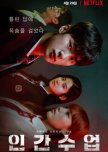
Grades, Guilt, and the Grind of Survival: Extracurricular Has No Heroes
Extracurricular doesn’t waste time trying to be your average high school drama.. and thank god for that. From the first episode, it sets itself apart with a premise so bold, it almost dares you to keep watching. And you should. Because what unfolds is one of the most tightly written, morally complex, and emotionally charged korean dramas in recent memory. Somehow, against all odds, it gets just about everything right.Let’s start with the premise, which might sound insane on paper, but is executed with surgical precision. Our main lead, Oh Ji-soo, is your typical straight-A student. Quiet, friendless, virtually invisible in the school hallways. He’s also running a clandestine security operation for a sex trafficking ring which involves a minor, under the moniker “Uncle” (삼촌). So, yes… not exactly your run-of-the-mill after school job.
Things spiral rapidly once his rich ( and miles “cooler” ) classmate Bae Gyu-ri discovers his double life. Their toxic dance of co-dependence, ambition, and imploding morality is one of the show’s most fascinating throughlines. There’s no neat hero-villain binary here. Everyone’s just trying to survive, clawing their way through the collapsing architecture of youth and society’s expectations.
What truly elevates Extracurricular above its peers is its characters. They’re painfully real, infuriating, vulnerable, and often walking contradictions. Ji-soo is particularly magnetic. A quiet kid with a mind like a steel trap, unraveling in slow motion. Despite being the mastermind of an exploitative criminal enterprise, you still find yourself rooting for him… a feat that should be morally impossible, and yet here we are.
Much of that is thanks to Kim Dong-hee’s phenomenal performance. He plays Ji-soo with a kind of jittery restraint that makes every twitch of his expression feel like a page turning in a much darker book. It's a portrayal so good, it almost makes you forget you’re empathizing with a teenage cyber-pimp. Almost.
The rest of the cast holds their weight, too. With insane chemistry and a level of emotional authenticity that never veers into melodrama. The show’s actors handle intense, morally thorny material with a maturity that puts many veteran performers to shame.
Visually, Extracurricular is a standout. The cinematography is sleek but not over-stylized. Those dreamy, almost surreal sequences where we’re pulled into the characters’ inner worlds? Gorgeous. They strike that balance between introspective and cinematic without looking like someone just discovered Instagram filters. The time jumps, often a narrative minefield, are handled with elegance, adding urgency without ever feeling like a lazy plot shortcut.
Thematically, this show bites off a lot. child exploitation, class disparity, systemic neglect.. and it chews every bit of it thoughtfully. It never feels like the writers are moralizing or turning trauma into aesthetic. Instead, the show pulls you in with a critique of how the world lets kids fall through the cracks and then wonders why they turn into monsters.. or worse, entrepreneurs.
If I had to dock points (and I do, because no work is perfect), it’s for the soundtrack. While the music does the job most of the time, there are moments, especially during more intense sequences, where a poorly chosen track saps the tension like a bucket to the head. It's not a dealbreaker, but given how well everything else is executed, it's a missed opportunity.
Still, if you’re looking for a high school drama that’s gritty without being “edgy for edgy’s sake” , emotionally complex, and just straight-up smart, Extracurricular should be at the top of your list. It's bold, disturbing, and unrelentingly honest. a K-drama that doesn’t want to be liked so much as it wants to be remembered.
And trust me.. you will remember it.
Was this review helpful to you?

The Art of Suffering: The Glory is Revenge at Its Most Human
K-dramas have long played in the sandbox of revenge thrillers, but The Glory doesn’t just enter the genre. It brands it with the heat of righteous fury. Led by a career-redefining performance from Song Hye-kyo, this drama is not merely a tale of vengeance. It’s a haunting meditation on trauma and survival.At the center of the storm is Moon Dong-eun, a former high school student whose life was shattered by vicious bullying. Years later, she returns. Not as a victim, but as the architect of a revenge plan, calculated to the last detail. Song Hye-kyo’s portrayal of Dong-eun is nothing short of mesmerizing. Known mostly for her romantic leads, here she strips herself of all softness. Her performance is cold, precise, and at times, unsettling in its restraint.
There’s a quiet, smoldering power in the way she moves, speaks, and watches. She doesn't cry. She studies. She doesn't scream. She plots. It's a masterclass in minimalist acting, and easily one of the strongest performances in her career to date.
While Dong-eun anchors the emotional weight of the series, one of the most unexpectedly compelling characters is Kang Hyeon-nam, played by the ever-brilliant Yeom Hye-ran. Initially introduced as a battered housewife looking to hire Dong-eun as a vigilante, Hyeon-nam quickly evolves into so much more. She becomes both accomplice and conscience, her quiet resilience slowly morphing into bold defiance.
What makes Hyeon-nam stand out is her unvarnished humanity. She is raw, broken, and terrified, but also funny, sharp, and deeply loyal. Her motivation isn’t abstract justice, but the very real, immediate desire to protect her daughter. In a series steeped in cold calculation, she is the emotional lifeline, grounding the plot.
Yeom Hye-ran delivers one of the series’ most heartfelt performances, imbuing her character with empathy and grit in equal measure. The evolution of her relationship with Dong-eun, from transactional partnership to something resembling chosen family, is a quiet highlight of the series.
Where The Glory excels is in its pacing and atmosphere. Writer Kim Eun-sook dives into far darker territory here. There are no whimsical gods or sweeping romances like his other works. Only fractured people, morally ambiguous choices, and an undercurrent of pain.
The pacing is deliberate, and some may find it slow. But it’s a necessary burn. Every episode pulls back a new layer. Of Dong-eun’s trauma, of her antagonists’ rot, and of the broader societal systems that allow abuse to fester. The show doesn’t ask for patience. It demands it.
The bullies, now successful adults, are portrayed not as cartoonish villains but as deeply broken people. Entitled, cruel, and often terrifying in their casual indifference. Lim Ji-yeon, as the ringleader Park Yeon-jin, is particularly chilling. Her glossy public persona is a perfect mask for a venomous core. Watching Dong-eun dismantle her life, piece by piece, is disturbingly satisfying.
But The Glory doesn’t allow you to cheer too easily. Revenge here is not clean or empowering. It’s messy, dehumanizing, and costly. The show constantly asks: what’s left of you once you’ve given everything to vengeance?
Director Ahn Gil-ho uses muted palettes, long silences, and oppressive stillness to craft a world where the past is inescapable. The show's cinematography reinforces Dong-eun’s alienation at every turn. Empty hallways, harsh lighting, and stark, clinical interiors frame her existence as one of emotional exile. Even moments of human connection feel dangerous.
The Glory is not a feel-good drama. It doesn’t reward your patience with catharsis, at least not in the traditional sense. It’s slow, methodical, and deeply disturbing, but in all the ways it intends to be. It’s a story about how some wounds never heal, how justice and revenge are often indistinguishable, and how carrying a torch for too long can burn you from the inside out.
Was this review helpful to you?
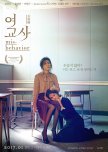
The Ethics of Aesthetics: Misbehavior and the Limits of Subtext
Wow, okay. Well. To start, Misbehavior is not a bad film. But it’s also not particularly good. It falls squarely in that frustrating middle space. A story with potential, a mood with bite, and just enough talent on screen to keep you watching… but not enough follow-through to leave any lasting impression.The premise alone is already a lot to chew on: two female teachers. A senior contract instructor and a newly hired full-time one become entangled in a tense, jealous rivalry over their male high school student. There’s a sexual component. Possibly romantic, although the emotional dynamics are so shallow and confused that it's hard to tell if the film is aiming for erotic tension, predatory power play, or just general mess. Either way, the setup is deeply ethically questionable. But strangely, that’s not the biggest problem here.
Uncomfortable or controversial subject matter can work when it’s handled with nuance and clarity of purpose. Misbehavior doesn’t have that. The film seems more interested in aesthetic discomfort than actual character or thematic development. It wants to be unsettling, but it doesn’t seem to know why. It gestures at taboos, at institutional power imbalances, at buried rage, but only ever in half-measures.
Let’s talk pacing. The first half is slow and vaguely tense. Like the story is winding a spring, waiting to snap. But the second half unravels way too quickly. Critical plot points come in rapid succession without emotional buildup or payoff. It’s jarring, not in an intentional, disorienting way, but more like a writer realizing they’re running out of time and speed-running the climax. By the time the credits roll, you’re still trying to process a shift that didn’t feel earned.
Kim Ha-neul is the saving grace here. Her portrayal of Park Hyo-joo is unnervingly restrained. A woman so tightly wound, so completely at the mercy of her own internalized failure, that even her most violent moments feel like they’re happening from a place of quiet, hollow inevitability. You can see the years of professional frustration, emotional suppression, and self-loathing living just beneath the surface. It’s a nuanced performance trapped in a script that doesn’t give her nearly enough to work with. She deserved a better vehicle.
Lee Won-geun’s character (Shin Jae-ha) is less a person and more a plot device. Painted to be manipulative, but we all know he’s the real victim here. The second teacher, played by Yoo In-young, is equally underwritten, which is a shame because the bones of a compelling rivalry are there. Instead, we get cardboard motivations and stiff confrontations.
One thing I will give the film: it resists the urge to offer a character to "root" for. Everyone here is flawed in different, unappealing ways. It’s the kind of story where you’re not meant to pick sides so much as watch the trainwreck unfold. I usually appreciate that.. narratives where everyone’s just as damaged as the next person, and you’re forced to sit in the discomfort of it all. But even that quality starts to wear thin when the characters are this emotionally undercooked.
The film is painted with a lot of big themes: gendered power dynamics, academic hierarchy, social invisibility, the ways institutions suppress and warp women’s agency. These are all rich, worthy subjects. But Misbehavior handles them like set dressing. You can see the intention in certain scenes. A passing line about job insecurity, a glance during a faculty meeting, the subtle difference in how the school treats the two women… but none of it is interrogated in any meaningful way.
Visually, the film works very well. It’s cold, sparse, and tonally cohesive. The sterile setting of the school complements the emotional emptiness of the characters. There's a kind of quiet, aching bleakness to the whole thing that’s effective in moments. But you can only ride on mood and minimalism for so long before you start to wonder if anything’s actually happening.
Final thoughts? Misbehavior could have been a disturbing, layered portrait of female rage, institutional failure, and manipulative relationships. It had the atmosphere, the actors, and the potential. But it stops just short of doing anything meaningful with them. What’s left is a film that looks serious, acts serious, but never quite earns its seriousness.
Would I recommend it? Only if you're in the mood for a morally ambiguous slow-burn that leaves you mildly frustrated. Otherwise, you’re not missing much.
Was this review helpful to you?

